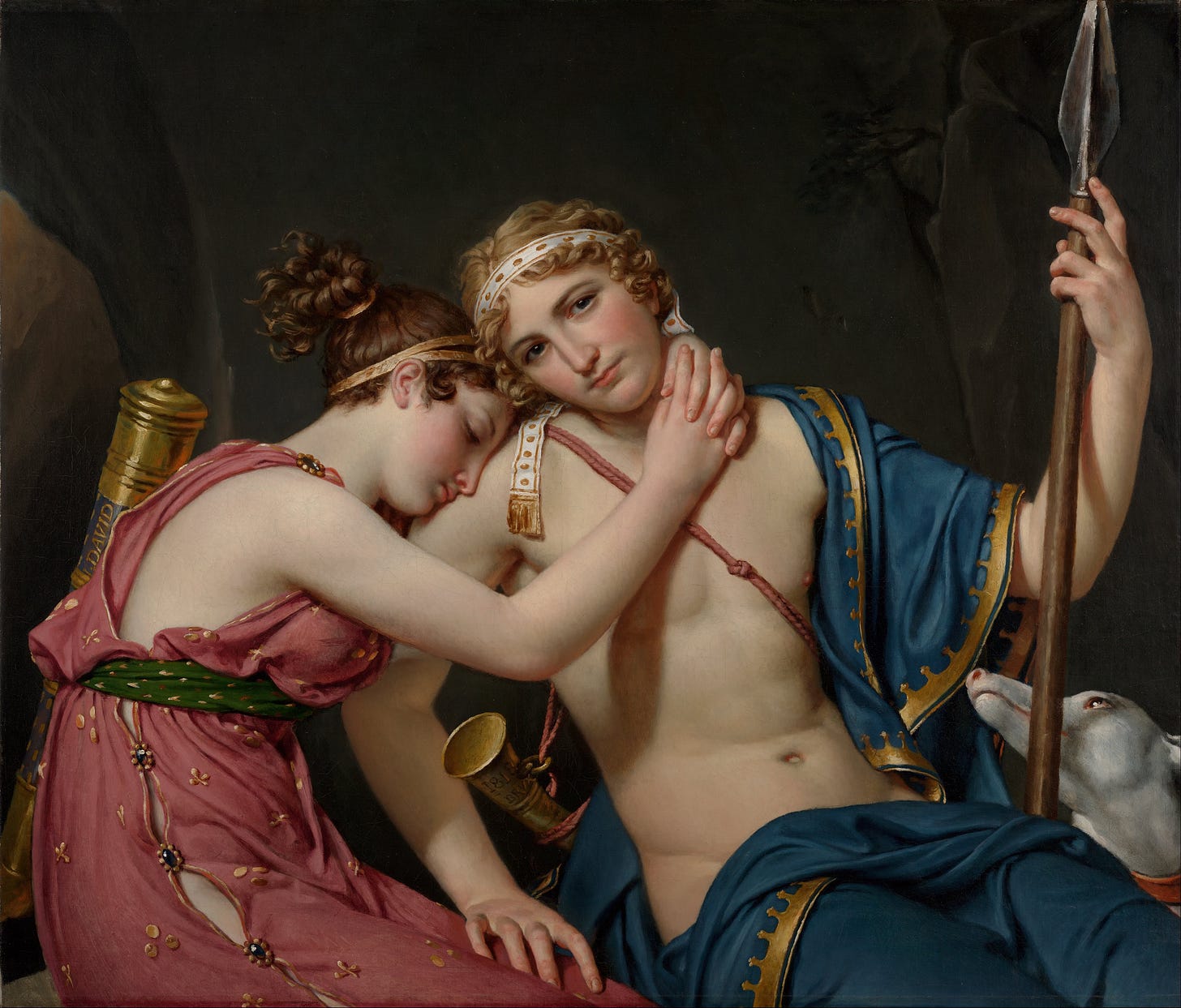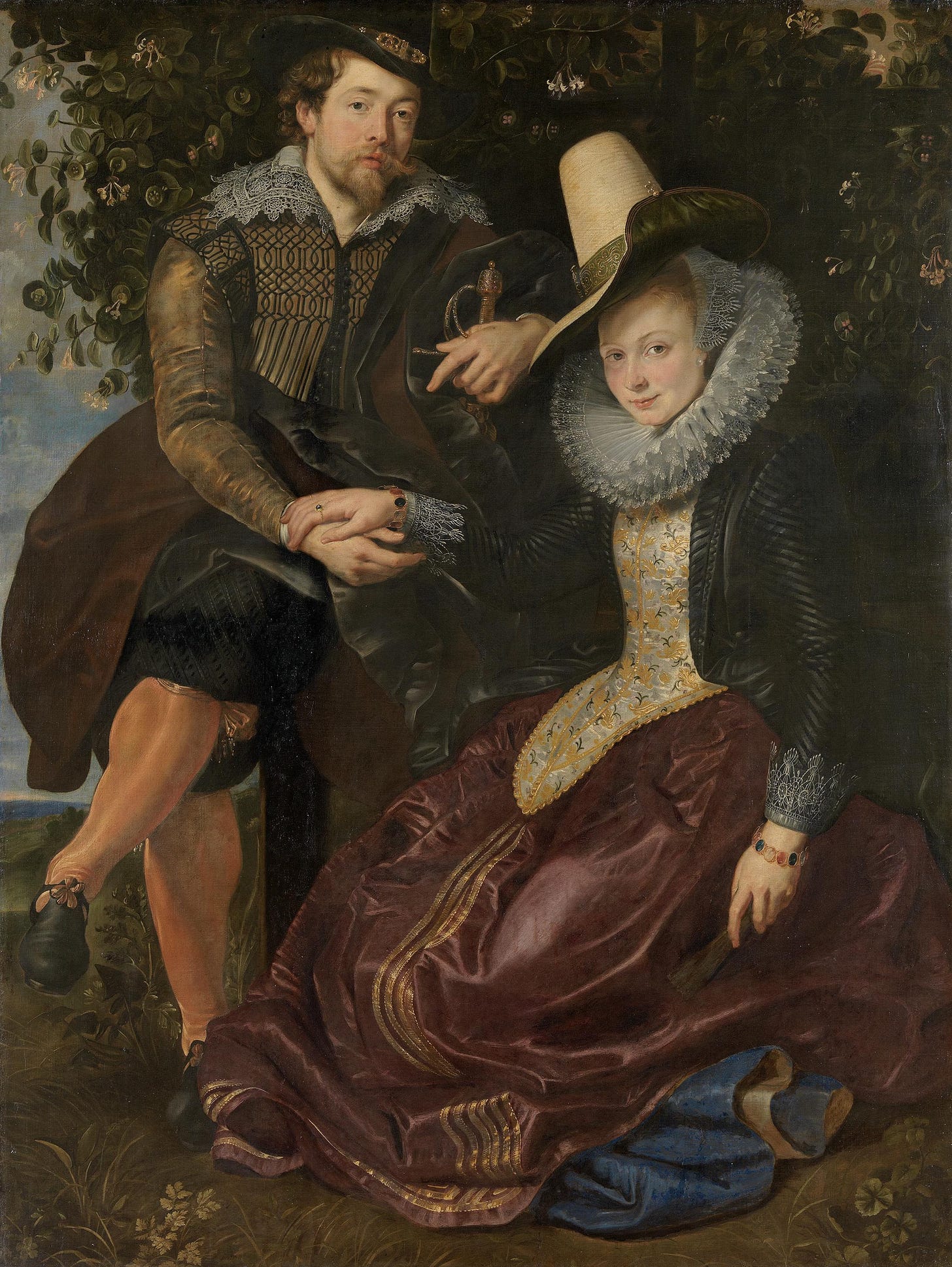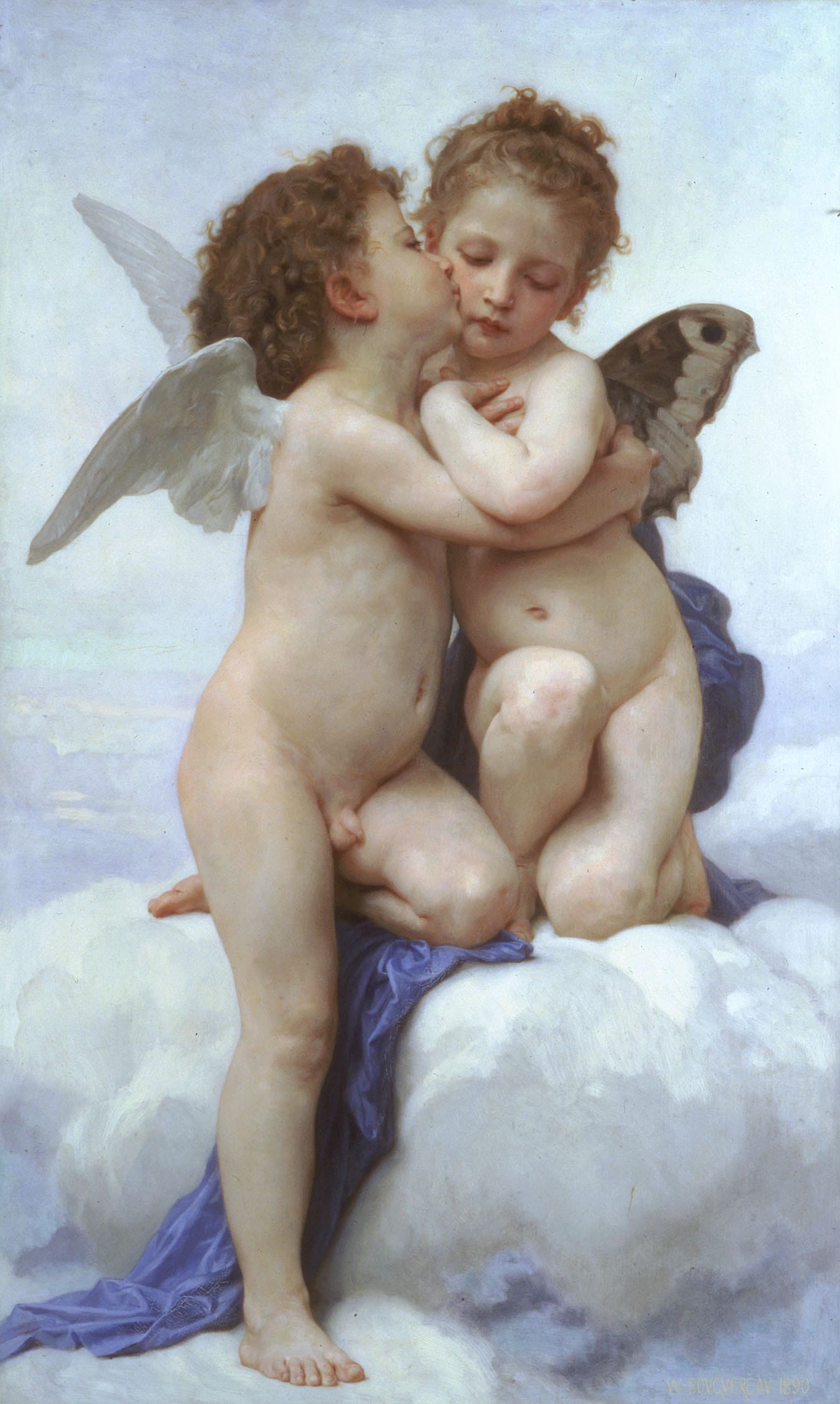
Love is a feeling, but commitment is a choice. The first is involuntary, a coup of the senses, a poetic trespass. It hijacks the nervous system before the intellect can formulate a theory. Love pulses with metaphor: a spark, a flame, a tide, a madness. It invites surrender, not logic. Commitment, by contrast, is sober, measured, and architectural. It is not the kiss under the rain, but the decision to be there when the storm hits. Love writes you sonnets; commitment signs the lease. And while love is often portrayed as the peak of human experience, it is commitment that reveals our deeper character. Is it about what lifts you off the ground? No, it’s what holds you up when gravity resumes.
The dissonance between love and commitment has always existed, though it was expressed through different systems of power and belief. In ancient Greece, eros – desire, madness, transcendence – was rarely expected inside marriage. Plato saw love as a ladder toward the divine, a disruption meant to elevate. Commitment, meanwhile, was social glue: a civic duty, a property contract, a family alliance. In the Middle Ages, courtly love flourished not within wedlock but outside it. Think of Lancelot and Guinevere, Abelard and Héloïse because true passion, it was believed, could not survive the mundane obligations of marriage. Love was a rebellion, a rapture; commitment was a structure imposed from without. The two existed in tension, necessary, perhaps, but not reconciled.

Then came a quiet revolution dressed in Enlightenment language. Suddenly, individuals began to assert the right to choose – to choose a partner, to choose love as the basis for marriage. With the rise of the novel came the rise of interiority: people wanted not only to marry, but to be understood. The Romantic era took this further, turning love into a secular religion. It was no longer enough to find a spouse, one had to find asoulmate. Commitment was no longer a duty, now it had to be poetic, redemptive, symphonic. But the myth came with a cost. If love had to feel eternal to justify commitment, what happened when the feeling ebbed? As Stendhal warned, what we call love may merely be “crystallization” … a projection of beauty onto something that may not, in fact, sustain us.
The 20th century cracked this ideal wide open. Freud destabilised the innocence of love, revealing that much of our desire is a return to the unresolved… the parent we couldn’t please, the wound we couldn’t close. Love became autobiographical, a mirror to our damage. Attachment theory would later confirm what Freud intuited: that we do not fall in love as blank slates, but as nervous systems patterned by early bonds. The securely attached can love and be loved without collapse; the anxious clutch and demand; the avoidant withdraw, confusing distance with dignity. And yet we call all of this “chemistry”, as if these ancient patterns weren’t directing the dance.
Simone de Beauvoir, in The Second Sex, exposed how women were taught to seek transcendence through being chosen, while men were taught to fear emotional dependence. Feminism questioned not love per se, but the unpaid emotional and physical labour women were expected to offer under the guise of commitment. Meanwhile, love was democratised, which means that birth control, divorce laws, civil rights expanded who could love, and how. But with that freedom came a new paradox: with choice came volatility. The more we could choose, the more we feared choosing wrongly.
And were we truly choosing? Or simply re-enacting familiar scripts dressed in modern costume? Today’s illusion of freedom often conceals deeper constraints. We curate love the way we curate images: perfected, filtered, groomed for consumption. Dating apps present partners like products; emotional connection is evaluated with the logic of UX design. Love becomes performance before it becomes presence. We advertise desire before we experience it. And beneath it all, the market hums: monetising longing, gamifying compatibility, turning solitude into a sales funnel. The tyranny of infinite choice seduces and exhausts us. We are urged to keep our options open, our hearts slightly ajar, just in case something better pings.
Men, in this terrain, face a silent crisis. The traditional script (to protect, to provide, to repress) has expired, but no coherent replacement has emerged. Emotional illiteracy, once a survival tactic, now breeds relational confusion. Many men are asked to be vulnerable without having been taught how, to show up without a map. They are told to connect deeply, even as they are still unlearning that depth is weakness. Intimacy becomes a minefield: longed for, feared, fumbled.
And so, what do we do with this inherited mess? First, we must stop treating love as self-validating. Just because you feel something doesn’t mean it’s trustworthy. Love can be delusional. It can be a trauma bond. It can be a performance of your own ideal self. Commitment, conversely, must stop being seen as the death of romance. Done well, it’s the scaffold love climbs. It’s the difference between a spark and a fire that keeps you warm. But this requires work – on ourselves, first. Not just learning how to love, but how to be loved without controlling the terms of the exchange. Not just staying, but staying without resentment, without passive-aggression, without the unspoken ledger of emotional debts.
Of course, none of this is easy. The human psyche doesn’t run on algorithms. We love inconsistently, against our better judgment, across incompatible timelines. Commitment in its truest form requires emotional intelligence, patience, humility, and a touch of madness. To commit is to engage in a kind of narrative: not the story you tell others, but the evolving truth you co-write with another person. It is the willingness to see and be seen in your most unflattering light, and to choose, still, to stand beside each other.

Here, philosophy offers us diverging maps. The existentialists – Sartre, de Beauvoir – believed love was not union but confrontation: the Other as mirror, as résistance, as invitation to freedom. Buddhists, meanwhile, speak of non-attachment, not indifference, but the act of caring without clinging, loving without needing to own. Both reject love as possession. Both point toward love as presence – attention that endures, even in impermanence.
In this way, commitment becomes the deepest manifestation of freedom, not its enemy. To stay, not because you must, not because you fear the alternative, but because you want to, is an act of liberation. It is not submission; it is autonomy in duet.
When love and commitment meet as equals, not as hostage and jailer, not as child and parent, they generate something rare: intimacy. And intimacy is vulnerability and also attunement over time. It is erotic, yes, but also spiritual. Think of Rilke, who said that a good marriage is one in which two people protect each other’s solitude. Think of Baldwin, who warned that love takes off the masks we fear we cannot live without and know we cannot live within. Or Barthes, who suggested that to say I love you is always an anticipatory mourning, a gesture toward loss.
To love and commit, then, is to live in full awareness of impermanence, and to stay, anyway. It is to wake up to yourself, and then to another, again and again, in all your unfinishedness. It is the discipline of continuing to find, not the thrill of being found.
In the end, what matters is not simply how we feel, nor even what we choose, but how we inhabit the space between. Love is not a destination; commitment is not a prison. When rightly understood, they are co-conspirators in our becoming. They demand rigour, imagination, forgiveness, and faith, not the religious kind, but the kind that says: even when I do not feel it, I will honour it. Even when it is hard, I will stay curious. Even when we are both changing, I will try to learn you again.
And to me that is the truest form of love, not the feeling that precedes the choice, but the choice that dignifies the feeling. Not the chemistry of recognition, but the courage of continuation. Not the passion of possession, but the poetry of presence.
With presence, not possession, with the discipline of staying, with the intimacy of attention, with curiosity, again and again, in the slow art of becoming and the courage of continuation,
Tamara





Two things strike me about this piece: first, it's sorely needed. I'm extremely tired of the noncommitment-as-empowerment narrative plaguing the last three generations. People are always writing about what they need, their health, their truth, their peace, their personal "journeys", etc. There's so little talk of what they provide; what they contribute; how they clarify; how they take care of others; how they make their immediate environment better; how their journeys link to the journeys of others, and so on. We are isolated and atomize and are becoming increasingly narcissistic and entitled as a consequence. We are all guilty here, this is not me riding a high horse.
The second thing is, you've avoided the trap that most people fall into when writing about love: licking all the icing off the cupcakes and discarding the rest. You speak about love so beautifully while avoiding the type of saccharine that someone like myself is allergic to. This resonates with me because it's about duty as much as it is about love.
You also touch on too much choice, which is absolutely crucial to understanding why relationships are suffering in the modern age. Some choice is good, and I would never claim otherwise as a classic liberal, but there is a point of diminishing returns. Too much choice, not only makes things complicated, but is destined to make us unhappy. Nothing is perfect, but when your choices are limited, it's easier to recognize that there are no perfect options. When choices are endless, you can't help but wonder what else is possible, and any imperfection with what you have causes instant buyer's remorse. Making a commitment, then seeing it through, becomes almost impossible.
Beautiful work, Tamara. Clearly, you're committed to your craft. I could've just said "I loved it", but love is not enough.
This is an extraordinary piece, lyrical, incisive, and rich with both historical depth and emotional clarity. The way you braid philosophy, psychology, and cultural history into a single thread is masterful. All your essays are. Your language pulses with life, but it’s the architecture beneath the prose, the scaffolding of ideas, that makes it unforgettable.
I would only add that perhaps love and commitment don’t just need to coexist, they need to challenge each other. What if love’s wild unpredictability is what continually tests the structure of commitment for weak points, not to break it, but to refine it? Like fire testing steel. And maybe commitment, when resilient yet adaptable, becomes the crucible in which love evolves from raw emotion into something consciously created. Not just something we fall into but something we build, with ritual and repair.
You captured the paradox of modern intimacy with elegance, but also given it hope—hope not rooted in fantasy, but in effort, presence, and mutual evolution. Thank you for this stunning reflection. You are a formidable writer.